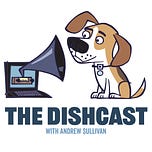The best political reporter in Britain returns to the Dishcast to discuss the election on July 4. Tim has been a chief political commentator at The Sunday Times since 2014, after serving eight years as political editor. His first two books, All Out War and Fall Out, are indispensable to understanding the politics of Brexit, and his new book is No Way Out: Brexit: From the Backstop to Boris.
You can listen right away in the audio player above (or on the right side of the player, click “Listen On” to add the Dishcast feed to your favorite podcast app). For two clips of our convo — on the fall of Rishi Sunak, and Nigel Farage entering the “clusterfuck,” as Tim puts it — pop over to our YouTube page.
Other topics: 14 years of Tory power; George Osborne’s austerity; Boris the cosmopolitan liberal Tory; how he screwed up Brexit; his common touch overshadowed by breaking his own Covid rules; deep spending during the pandemic; his bromance with Zelensky; vowing to cut migration but legislating mass, unskilled migration; Theresa May unable to right the ship; the Liz Truss disaster; her naive libertarianism and supply-side shock therapy; Rishi Sunak sweeping in from a smoke-filled room; coming in as a technocratic problem-solver but lacking the political skill; surrounded by Yes Men and “surprisingly brittle”; his rolling series of campaign blunders this month — starting with his election announcement in the pouring rain; the D-Day disaster; Nigel Farage entering the “clusterfuck” and splitting the Tory base; losing all his previous seven races for Parliament; how Reform will get one, maybe two seats; how Farage is close with Trump and “more jovial”; how Farage had to backtrack on Putin ; why Keir Starmer is not proposing radical change (like Thatcher did); how he’s touting “stability” and “competence”; his policy is thin; my reflections on befriending and debating Keir during our school days; how he was a class-war leftist in his youth, with swagger; the depth of his ambition (even more than Rishi); how he outmaneuvered Jeremy Corbyn and distanced the party from anti-Semitism; the Cass Review; China policy; Blairism; how old party allegiances are mostly gone; and how July 4 could see the worst election loss since 1906.
Browse the Dishcast archive for an episode you might enjoy (the first 102 are free in their entirety — subscribe to get everything else). Coming up: Erick Erickson on the left’s spiritual crisis, Anne Applebaum on autocrats, Lionel Shriver on her new novel, Bill Wasik and Monica Murphy on animal cruelty, Van Jones, and Stephen Fry! Send any guest recs, dissents, and other comments to dish@andrewsullivan.com.
On Michael Oakeshott — the subject of last week’s episode with Elizabeth Corey — a listener writes:
Thank you and Elizabeth so much for that extraordinary conversation. It was just utterly brimming with wisdom and love of life.
Here’s a clip from last week:
Another wants more of Oakeshott:
Your 2021 column, “Religion and the Decline of Democracy,” found me at the right time, and I’ve been thinking of it ever since it appeared. You caused me to fall into a pretty deep Oakeshott rabbit hole. In the process, I discovered that you were/are an Oakeshott scholar, and that “the deadliness of doing” is an idea you have long pondered.
It’s also prompted me to pull out an old prayer rope, and I’m planning to haunt a church about a block from my office. Oh, and I decided to resign from a part-time job, which at this point is mainly just doing — a lifelong tendency/pathology of mine: I do, therefore I am.
I would like to read and learn more about Oakeshott. Could you please suggest some practical reading?
Start with the essays. Then the last third of On Human Conduct. Another writes:
Michael Oakeshott is supposed to have said that “a good university just needs three things: serious intelligent people, a library, and a cafeteria. All the rest is imposed by society.” This view was relayed in a seminar at the LSE in the early 1990s, and I never found a citation or anything similar. Since you are one of the few experts on Michael Oakeshott, have you come across it? Does it ring true?
I do think that it is a very elegant way of thinking about higher education, and thus also about the need for curiosity, debate, talking to each other, and an open-ended endeavour, rather than an institution that seeks to forge (or even impose) a kind of morality.
I don’t know about that quote. Sadly I never got to study with him. Here’s a guest recommendation for a future pod:
Hello from a Dish subscriber going on two years. I recently read Kevin Williamson’s 2019 book, The Smallest Minority: Independent Thinking in the Age of Mob Politics. He quotes Michael Oakeshott numerous times, so it made me wonder if you would ever engage him on the Dishcast?
Good idea. Another rec:
I’d like to suggest Andrew Solomon for the podcast. He’s written two incredibly accomplished and much-praised books that have won national awards. The first is The Noonday Demon, on depression. He’s researched it and lived it and suffered greatly from it. The second is Far From the Tree, about the challenges faced by the parents of exceptional children with special needs: deafness, dwarfism, Down syndrome, schizophrenia, autism, prodigies, children conceived in rape, kids who become criminals, transgender. I think you’d have an illuminating conversation with him, especially on the trans issues that some teens and parents are dealing with right now.
Once I recover from occasionally being confused with him, sure. Another listener is catching up on episodes:
I just listened to Jeffrey Rosen and Kara Swisher back to back. You know what, you have too many people on who you’ve known in the past and considered buddies. You also spend too much time on the internet — its history, its impact, its iterations. I thought it reached the ridiculous with Swisher.
Jeffrey Rosen proved to be much more interesting than I would have expected, and I’m glad you had him on. There was some intellectual gravity there that I appreciated.
A reader looks to the looming election across the Pond:
It certainly looks like the UK tabloid headlines on July 5 will be something along the lines of: “Tories Hit By Perfect Starm.” Actually this is quite worrisome to me, since when one looks at prior election results, it appears that when the UK goes left, the US goes right (and vice versa).
Nevertheless, Rishi is scaring sheep, getting grief on a call-in radio program for eating candy when so many cannot get dental care appointments, and now getting backstabbed by compulsive gamblers in his party (similar to insider trading here in the States). I fully expect him to be blamed for making babies cry at some point before the July 4 election! It’s so absolutely sad for him that it’s laughable. And it’s not far-fetched to think that at this point he’s outright trying to lose so that he can pack up and move to California, as commentators have stated.
Another reader looks to politics stateside:
I appreciated your piece on Douthat’s interview with JD Vance — a richly deserved takedown of his disgraceful apologetics for Trump’s authoritarian behavior. While you were right to focus on his defense of Trump’s behavior after the 2020 election, there were two other aspects of Vance’s position that I found breathtaking and merit criticism.
One was the incoherence of his economics. He wants wages for workers to rise, but what effect does he think that will have on prices? It’s a recipe for permanent inflation. This is true of all economically nationalist proposals to re-shore manufacturing, supply chains, etc. They may well be defensible on policy grounds, because the benefits may outweigh the costs, but could we please not pretend that there won’t be any costs — which is simply to repeat the mistake of outsourcing so many American jobs from the other direction. Lowering the cost of production by shipping jobs overseas was great for American consumers, who reaped the benefits of lower prices, but it was terrible for the producers who lost their jobs. Paying higher costs of production to recreate those jobs will reverse the distribution of costs and benefits.
And let us dwell for a moment on Vance’s declaration that replacing most workers at McDonald’s with kiosks while paying the few workers who remain higher wages will be a win-win — innovation plus higher wages. He sounds, dare I say it, like a member of the Business Roundtable. Er, what about the workers who got replaced by kiosks? Might they not feel like the workers whose jobs got shipped to China, whose interests Vance claims to represent?
The other part was his suggestion that the “feelings” of Trump’s supporters that the election was stolen deserve some deference. He sounded exactly like those woke college students he hates, who argue that their feelings mustn’t be hurt. Now, I am not one of those who argues that feelings don’t matter, because I think we should try to respect others’ feelings when we can so as to avoid being jerks, but I also don’t think that people’s feelings (including mine) are the only thing that deserve consideration or should dictate one’s view of reality. Additional evidence is required, and Trump’s supporters don’t have it.
Our reader thread on IVF continues from the dissents on the main page:
As a mother of two beautiful children born through the miracle of IVF, and the owner of more frozen blastocysts — more than I even care to say — I want to thank you for your column. While I think you are wrong in your extreme conclusion, those frozen blastocysts do weigh on my heart, and many people have entirely avoided having this conversation with me at all. Your brave, explicit argument has helped me clarify my own thinking on the question of what to do with these extra “embryos” — so the main thing I want to say is thank you.
But I have a few points of correction and/or clarification (which bring me to some follow-up questions):
Listen to this episode with a 7-day free trial
Subscribe to The Weekly Dish to listen to this post and get 7 days of free access to the full post archives.













